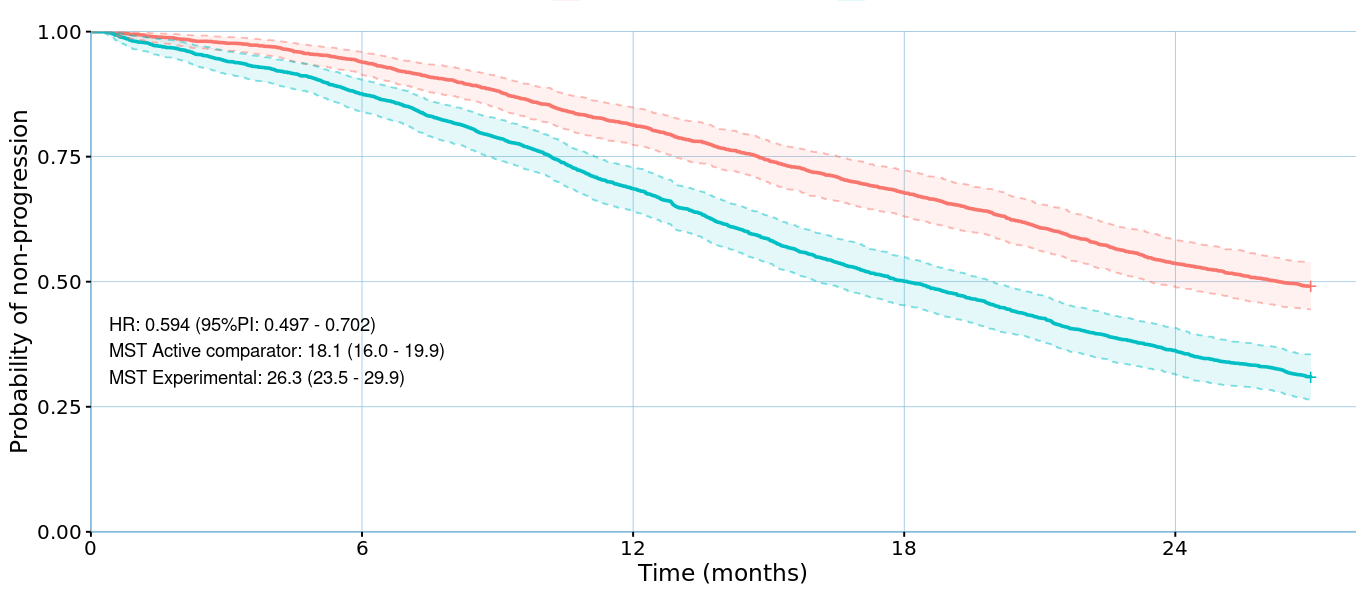New demonstration of the predictive potential of an in silico clinical trial in oncology
Quantitative Systems Pharmacology (QSP) model of lung cancer and 5,900 digital patients architected to complete the fully independent in silico simulation to predict findings from a 27 months, global Phase III trial with the jinkō platform
LYON, FRANCE and NEW YORK (November 13th, 2023) – Novadiscovery, a health technology company leading AI-driven in silico clinical trial simulation with its jinkō platform, today announced to have once again demonstrated the potential of their simulation technology by predicting the findings of MARIPOSA Phase III clinical study.
In a three-year collaboration that saw Novadiscovery work closely with noted researcher and thoracic oncologist Prof. Michaël Duruisseaux (Hospices Civils de Lyon, Cancer Research Center of Lyon UMR INSERM 1052 CNRS 5286, Université Claude Bernard, Université de Lyon, France), and Janssen-Cilag France, the team successfully predicted the results of the eagerly awaited MARIPOSA trial. These predictive findings were shared with the Janssen-Cilag France team a week in advance of the trial results being unveiled at the 2023 ESMO conference. Novadiscovery did not receive any proprietary information from Janssen to produce this simulation. Prof. Michaël Duruisseaux was involved as an investigator, but not in the steering committee and was not informed of the non-public data from the trial.
Novadiscovery’s simulations conducted on the jinkō platform using the NSCLC model led to confidence interval overlapping predictions with an HR of 0.60 (CI, 0.50-0.70). This was accompanied by a median Time to Progression (TTP) prediction of 26.3 mo (CI, 23.5 – 29.9) for the combination treatment arm and a median TTP of 18.1 mo (CI, 16.0 – 19.9) for the Osimertinib treatment arm.

Results of the MARIPOSA trial simulation conducted on the jinkō platform a week in advance of the trial results being unveiled during ESMO 2023, with in blue the simulated active comparator arm and in red the simulated experimental arm.
On October 23rd, during the 2023 European Society for Medical Oncology (ESMO) congress, the findings of the phase III MARIPOSA study were officially released. The results have shown that at a median follow-up of 22.0 months, the combination treatment of Amivantamab + Lazertinib showcased a remarkable 30% reduction in the risk of disease progression or death when compared to Osimertinib. The statistics read as follows: HR, 0.70; 95% CI, 0.58–0.85; P<0.001, with a median PFS of 23.7 mo (95% CI, 19.1–27.7) versus 16.6 mo (95% CI, 14.8–18.5) for the Osimertinib.
François-Henri Boissel, CEO of Novadiscovery, noted, “This second proof of concept in a row showcases the potential in silico opens up for the optimization of the development of innovative new treatments.”
“These new predictions further evidence the utility and complementarity of in silico approaches. Employing such techniques in the future will enable us to establish better clinical trial designs,” commented Prof. Duruisseaux.
This latest achievement crystallizes the role and potential of predictive simulation platforms in the realm of clinical trials. By successfully anticipating the results of these trials, Novadiscovery, in collaboration with partners like Janssen, sets the stage for a transformative approach to drug development, potentially leading to accelerated benefits for patients worldwide.
Representing Janssen France, M. Bergeron (Medical Director in Oncology) stated “We’ve collaborated with Novadiscovery on the development of the NSCLC mechanistic model for over three years, and we’re thrilled to see the simulation results validated on one of our studies. This predictive model can now be employed to simulate hypotheses that we cannot test in real life, especially in populations with rare driver mutations like the exon20 insertion on EGFR.”
This work is the result of a collaboration between Novadiscovery scientists, Prof. Duruisseaux and Janssen-Cilag France for more than three years to build predictive trial simulations using an EGFR-mutant non-small cell lung cancer model, recently published in its first iteration in Nature: NPJ Systems Biology & Applications.
Novadiscovery’s jinkō platform is developed by leaders in quantitative systems pharmacology (QSP). The company currently partners with half of the world’s largest pharmaceutical and drug development organizations to scale the application of clinical trial simulation technology in drug research and development.
Follow Novadiscovery on LinkedIn and Twitter for more news and information as it becomes available.

